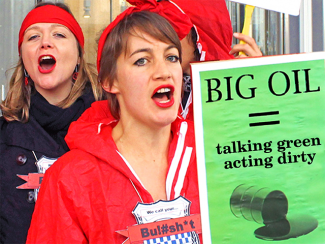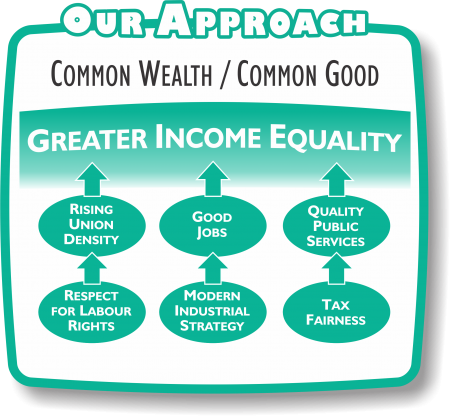BLAME BIG OIL
Targetting big oil as the biggest climate crisis villain

YA GOTTA NAME THE VILLAIN. Politicians in Canada are not ready to do that says Keith Stewart and so their plans to combat our climate crisis are too little, too late.
Stewart is a senior energy strategist with Greenpeace Canada. “Our problem is upstream,” he says “oil and gas is the single largest source of greenhouse gas emissions in the country and the fastest rising source, so until we’re willing to tackle the oil industry, then we are not acting like this is an emergency or even a serious problem.”
The Liberals, NDP and Greens have all put forward serious climate plans. However none of them explicitly name the oil and gas industry as the main barrier to aggressive action to combat our climate crisis.
“That needs to be part of a climate plan, and it isn’t in anybody’s plan right now, and even saying that in Canada is impolite,” says Stewart.
The Conservatives steadfastly deny any corporate blame for the climate emergency and are almost mute on the climate emergency as a pressing reality.
Punish the polluters
Politicians in the USA, however, pull no punches. All the frontrunners in the race to be the Democratic Party 2020 candidate for president of the USA are happy to name the oil industry as the villain. Bernie Sanders, for example, gets mainstream media coverage when he calls the fossil fuel industry a “criminal activity that cannot be allowed to continue.”
Kamala Harris, a former prosecutor, vows to take legal action against oil and gas companies for their role in sowing doubt and uncertainty about climate science.
“This is what we did to the tobacco companies,” says Harris. “We sued them, we beat them in court.” Harris dedicates one full point in her 5-point climate plan to “hold accountable those responsible for environmental degradation, the misinformation campaign against climate science, and creating harm to the health and wellbeing of current and future generations.”
Show us the money
The Greens, NDP and Liberals all offer substantial plans to combat our climate crisis, but none of them are “all in” yet when it comes to the kind of money it will take to win that fight.
For example, the NDP has one of the most expansive proposals of all the Canadian plans: the party promises $15 billion to create 300,000 low-carbon jobs. Fifteen billion sounds like a lot. It works out to spending $454 per Canadian. However Bernie Sanders would spend 110 times as much per American.
Sanders promises $16.3 trillion to help shift the U.S. economy away from fossil fuels and create 20 million jobs. That works out to spending about $50,000 per American.
All the parties in Canada agree we face a “climate emergency,” says Stewart. But none of them have yet offered a response equal to the reality of that emergency.
Stewart says it’s long past the time for Canadian politicians to reduce the carbon—and political—footprint of oil and gas companies. He suggests beginning with:
-
no federal permits or funding for infrastructure projects that delay our progress to a 1.5 degrees world;
-
a ban on fossil fuel advertising or sponsorship of public events;
-
a guaranteed high-paying green job for anyone displaced by Canada’s transition to a zero-carbon economy.
Some good news
We have to keep the faith. We have to believe we can win this fight for our lives. We have to look past the constant deluge of bad news about ever rising carbon emissions. We have to look for the good news—and there is good news.
For example, in his September 20 article in the New York Times Al Gore pointed out:
- Last year, solar and wind represented 88 percent of the new electricity capacity installed in the 28 nations of the European Union, 65 percent in India, 53 percent in China and 49 percent in the United States.
- This year, several American utilities have announced plans to close existing natural gas and coal generating plants — some with decades of useful life remaining — to replace their output with cheaper electricity from wind and solar farms connected to ever-cheaper battery storage.
- Today, the fastest-growing occupation in the United States is solar installer. The second-fastest growing job: wind turbine service technician.
- The number of electric vehicles on the road has increased by 450 percent in the past four years. It is expected the cost of electric vehicles will soon drop well below the cost of comparable gasoline and diesel models.
- Over half of all buses in the world will be electric within the next five years, a majority in China.
- Google has reduced the amount of electricity required to cool its enormous server farms by 40 percent using state-of-the-art artificial intelligence.
- A farmer-led regenerative agriculture revolution avoids plowing and focuses on building soil health by sequestering carbon dioxide in the ground, making the land more fertile.
- Trees are still the best available technology for pulling carbon dioxide from the air. That’s why many nations are starting ambitious tree planting efforts. Ethiopia recently reported planting 353 million trees in 12 hours, nearly double the goal of 200 million.
Another hard truth
Gore also writes: “Yet for all this promise, here is another hard truth: All of these efforts together will not be enough to reduce greenhouse gas emissions sufficiently without significant policy changes.
“This will require a ferocious attack on the complacency, complicity, duplicity and mendacity of those... that are sacrificing the planet for their greed. To address the climate crisis, we must address the democracy crisis so that the people themselves can reclaim control of their destiny.
“Political will is a renewable resource and must be summoned in this fight.”
- 30 -













Add new comment